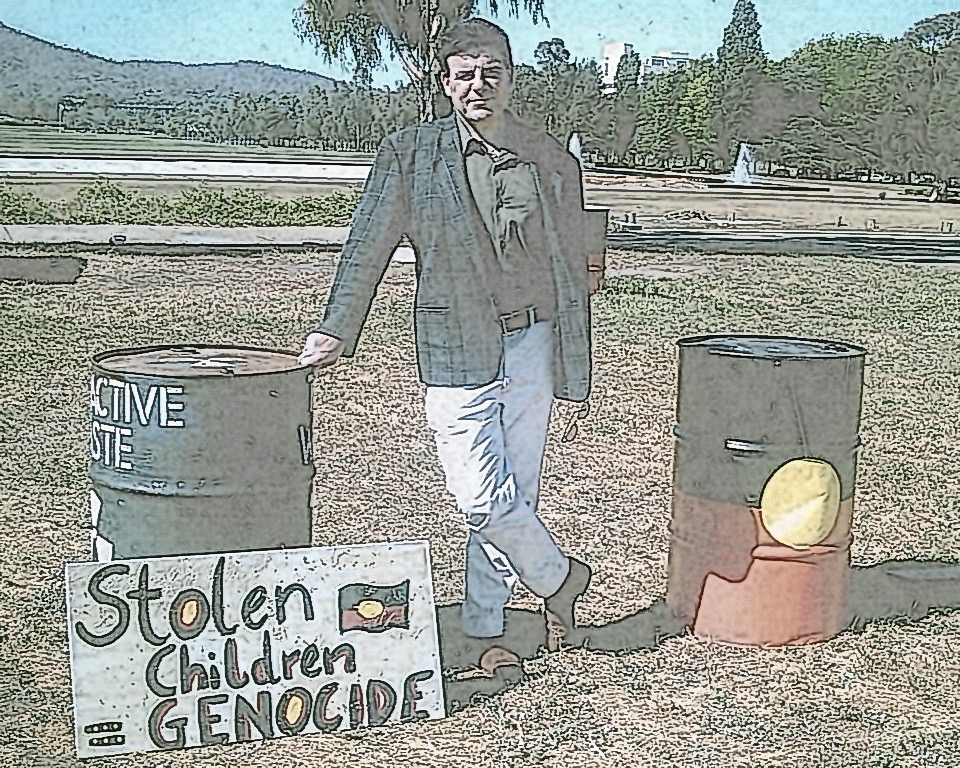This is a tale where fact mixes with fiction to present a story forgotten. The protagonist is a blak man, yet the story should resonate with every Australian who believes in justice and integrity and that personal accountability is not just for the little guy but should extend to the powerful elites in government and business.
In the heart of a nation that prided itself on its democratic ideals and commitment to justice, a shadow loomed over the corridors of power. The story begins in a small town, nestled between rolling hills and sprawling plains, where the sun rose each morning to illuminate the lives of its diverse inhabitants. Among them was Bakchos, a proud Indigenous man whose lineage traced back to the ancient custodians of the land. With deep roots in his culture and a fierce dedication to his community, Bakchos was not one to shy away from injustice.
The political landscape was dominated by the Australian Labor Party (ALP), an entity that had long been synonymous with progress and reform. Yet, beneath the veneer of their promises lay a troubling reality—a system riddled with corruption and a blatant disregard for the rights of Indigenous peoples. When Bakchos discovered evidence of systemic malpractice within the ALP, he resolved to take a stand for justice and integrity, determined to hold the party accountable for its transgressions.
What ensued was a harrowing battle that would test the limits of Bakchos’s resolve and the very fabric of the judicial system. The ALP, feeling the heat of scrutiny, resorted to every dirty trick imaginable to deflect accountability. They obstructed justice at every turn, employing tactics that would make even the most hardened political operatives blush. Bakchos found himself ensnared in a web of deceit, where truth became a casualty in the relentless pursuit of power.
As the investigation deepened, the stakes escalated. Bakchos’s affidavits, which contained crucial evidence against the ALP, were stolen under the cover of darkness, replaced with forgeries crafted by those who would stop at nothing to protect their interests. The political elite, sensing their control slipping, unleashed a torrent of attacks against Bakchos, not only questioning the validity of his claims but also resorting to insidious racial slurs aimed at undermining his credibility. They painted him as an outsider, an adversary to the very fabric of the nation, despite his deep-rooted ties to the land and its history.
The Director of Public Prosecutions (DPP), a key player in this unfolding drama, adopted a chilling stance that sought to deny Bakchos’s humanity as an Indigenous person. In their eyes, he was merely a pawn in a game of political chess, a statistic to be manipulated in the pursuit of a conviction that would serve their narrative. Yet, the dehumanisation only galvanised Bakchos’s resolve. He understood that the fight was not just for his own dignity, but for the countless voices silenced by the very system that was meant to protect them.
As the case moved to trial, the tension in the courtroom was palpable. A predominantly white jury sat in judgment, tasked with the monumental responsibility of discerning truth from fiction amidst a cacophony of political manoeuvring. The DPP, armed with a barrage of biased rhetoric, attempted to sway the jury, hoping to exploit ingrained prejudices. The jurors however, , refused to buy into the racism that permeated the prosecution’s case. They listened intently, their hearts and minds engaged in a battle of conscience.
In the face of overwhelming adversity, Bakchos stood tall, embodying the resilience of his ancestors. He recounted his experiences, his voice unwavering, and his spirit unbroken. He spoke of the sacred connection to the land, the stories of his people, and the injustices they had endured for generations. His testimony resonated deeply, breaking through the barriers of race and prejudice, reminding the jury of their shared humanity.
In a landmark moment that would echo for years to come, the jury delivered their verdict. They found in favor of Bakchos, rejecting the orchestrated attempts to vilify him. The decision was not merely a triumph for one man; it was a resounding declaration against the racism and corruption that had long plagued the system. It sent ripples through the political landscape, a clarion call for accountability and justice that could not be ignored.
As Bakchos walked away from the courtroom, the sun setting behind him, he understood that the journey for justice was far from over. Yet, he felt a renewed sense of purpose. The fight for integrity and accountability was a collective endeavor, one that required the voices of many to be heard. In his heart, he carried the hope that one day, the ideals of justice would extend beyond the confines of a just-us system, creating a space where all individuals, regardless of their background, could stand tall and be heard.
In the aftermath, Bakchos worked to be a symbol of hope for the marginalised, for those who had long been silenced. His courageous stand illuminated the urgent need for reform within a system that had favored the elite at the expense of the vulnerable. The ALP, faced with a reckoning challenging perceptions of their diversity and equality, weakening their grip on power so that they were forced to confront the legacy of their actions.
The tale of Bakchos serves as a powerful reminder that in the face of adversity, courage and integrity can illuminate the darkest paths, and that the quest for justice is a journey worth undertaking, no matter the obstacles that lie ahead.

